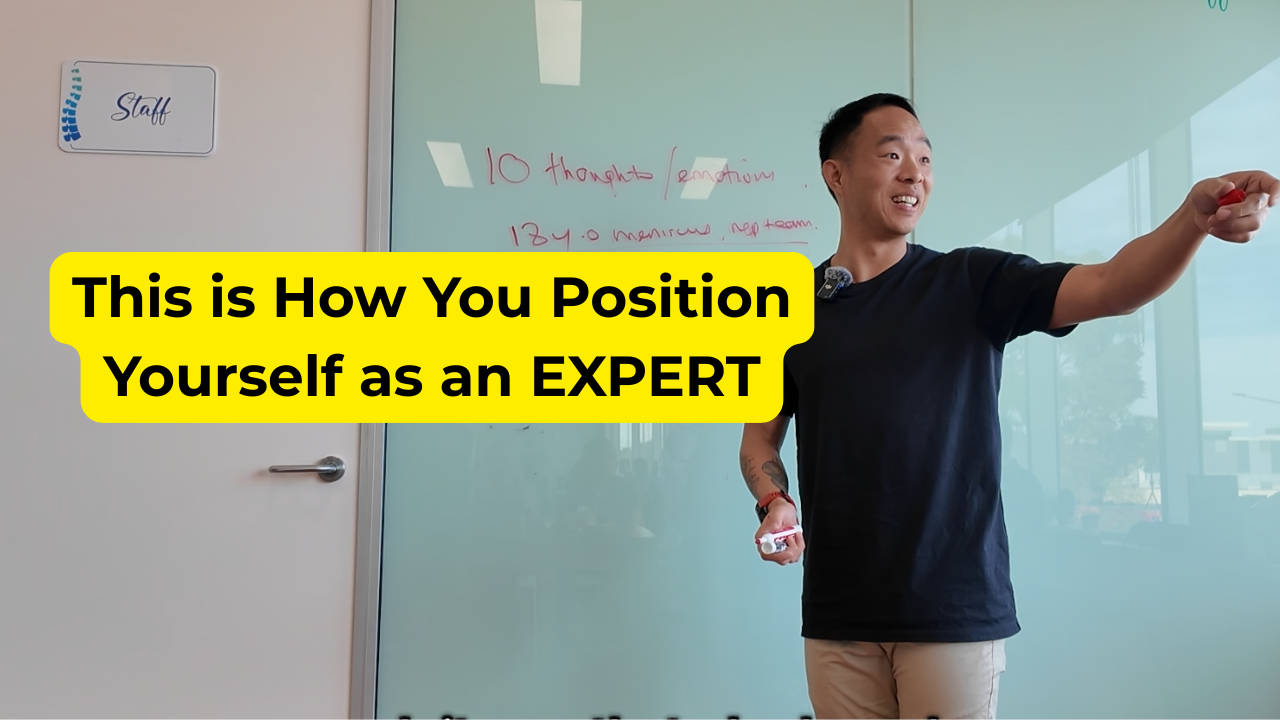How to Become an Expert WITHOUT Saying 'You're an Expert'
Jun 14, 2025
Have you ever sat in a consult and noticed that your patient has raised eyebrows that suggest they don't 'trust' you?
It happens a lot - and it's a completely natural occurrence in health. After all, unless they've researched you extensively, they know next to nothing about you.
And so it's completely normal for them to wonder whether you're an expert.
If your fix to being an 'expert' is to flex your degree or say 'I'm an expert', I've got some bad news for you.
This is the fast lane to the opposite side. Only snake oil salespeople tend to talk about themselves as 'experts.'
So if we can't 'talk' about our expertise, how do we SHOW that we are experts?
Well, you can watch the video below... or just keep reading!
Please remember this...
A patient measures your expertise in relevance to their life.
For example, if you're a clinician reading this then I surmise you might be struggling with confidence and rebookings in practise.
And this lack of confidence in the workplace is making you doubt whether you're supposed to be in this profession at all.
And maybe if you're in a relationship, it's spilling into your interactions with your partner because you're second guessing yourself with what you say.
No problem works in isolation - it's a total package.
Now if I was even 50% correct, you'd think 'oh wow, Phil knows what I'm going through.' And through that process, I've gained credibility in your eyes because I've demonstrated a thorough understanding of your life.
And that's only three problems. As you'll see in the video, you can have 10, 15, 20 and infinite amount of problems you could deduce from your patient.
Another example could be a young mother who is dealing with back pain 3 months post pregnancy.
Here are 10 potential problems they could be facing in their life that are related to her back pain (but not physical).
1. Low self-esteem because baby isn't latching due to high stress state of mother
2. Inability to bend over causing a feeling of worthlessness
3. 0-2 years for a mother is the loneliest time - lack of support causing feelings of isolation and depression
4. Difficulty communicating her hardship with husband because she feels she 'should be pulling her weight'
5. Feelings of worthlesness because 'other mothers' seem to be doing fine
6. Feels like a bad mother because she hesitates to pick up her child in the cot
7. Back pain is stopping her from leaving the house - lack of social support
8. Pain is making her more stressed leading to moments of anger at her child
9. Post natal depression
10. Resentment toward her new life
These are all possibilities a new mother could experience if they have back pain. And when they come to see you, if you can even demonstrate expertise in ONE or TWO of these through tactical use of story telling - you will immediately gain credibility in their eyes.
Yes, I know as a clinician, you never thought this is something you'd have to understand - or even talk about. But remember that you are treating a HUMAN, NOT a condition.
And a human's musculoskeletal problem is rarely that. It's much more.
So if you want to become an 'expert', stop talking about yourself and start UNDERSTANDING the person who you want to be an expert FOR.
See why 300+ clinicians have bought my eBook 'How to Rebook Patients WITHOUT Being Pushy.'
